Key takeaways:
- Art competitions serve as a platform for artists to showcase their talent and foster personal growth through community engagement.
- Different types of competitions, such as juried and open-call, provide diverse opportunities for artists to express creativity and gain recognition.
- Participating in competitions can enhance confidence, provide exposure, and offer valuable feedback to improve artistic skills.
- Preparation, understanding guidelines, and practicing presentations are crucial for success in art competitions.
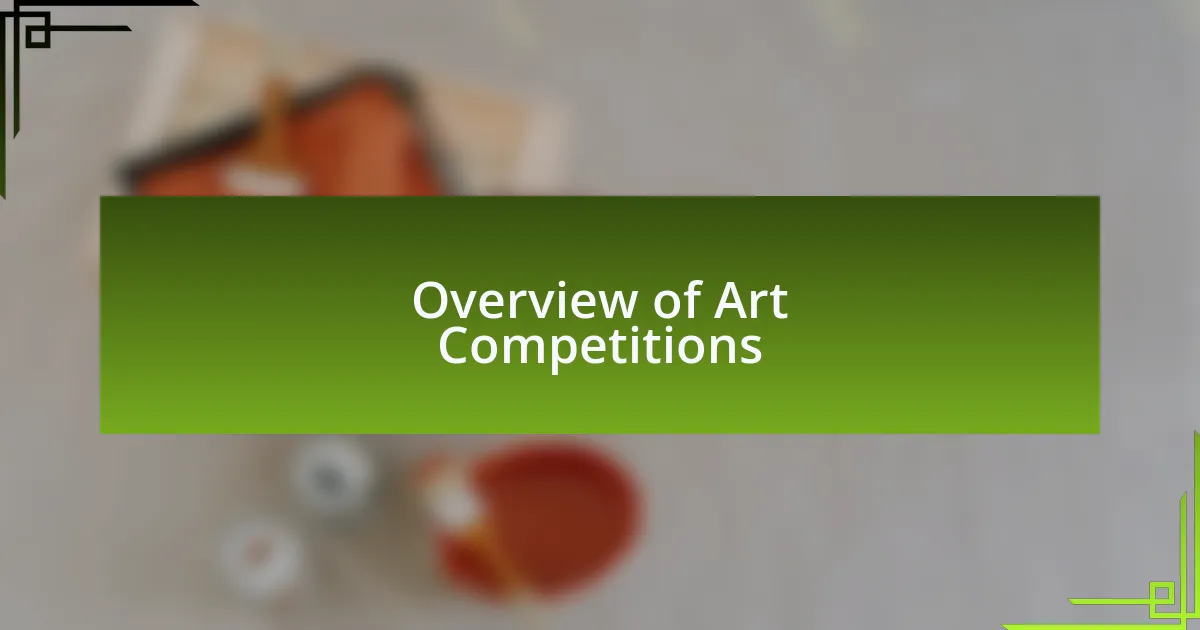
Overview of Art Competitions
Art competitions offer a vibrant platform for artists to showcase their talents and creativity. I’ve always found that these events can feel electric, filled with anticipation and excitement as participants await the judges’ decisions. Have you ever felt that rush, just standing in a gallery, surrounded by stunning works and a palpable sense of community?
These competitions come in various forms, from local community showcases to prestigious international contests. I remember attending a local art fair, where I was stunned by the raw passion and diverse styles of artists. Each exhibit told a story, captivating everyone who stopped to admire it—an unforgettable experience that cemented my love for the art world.
Moreover, participating in these competitions can be a transformative journey for many artists. I once observed an artist who started shy and reserved but, through a competition, gained the confidence to share her voice with a broader audience. Isn’t it inspiring to think about how these events not only recognize talent but also foster personal growth and connection among artists?
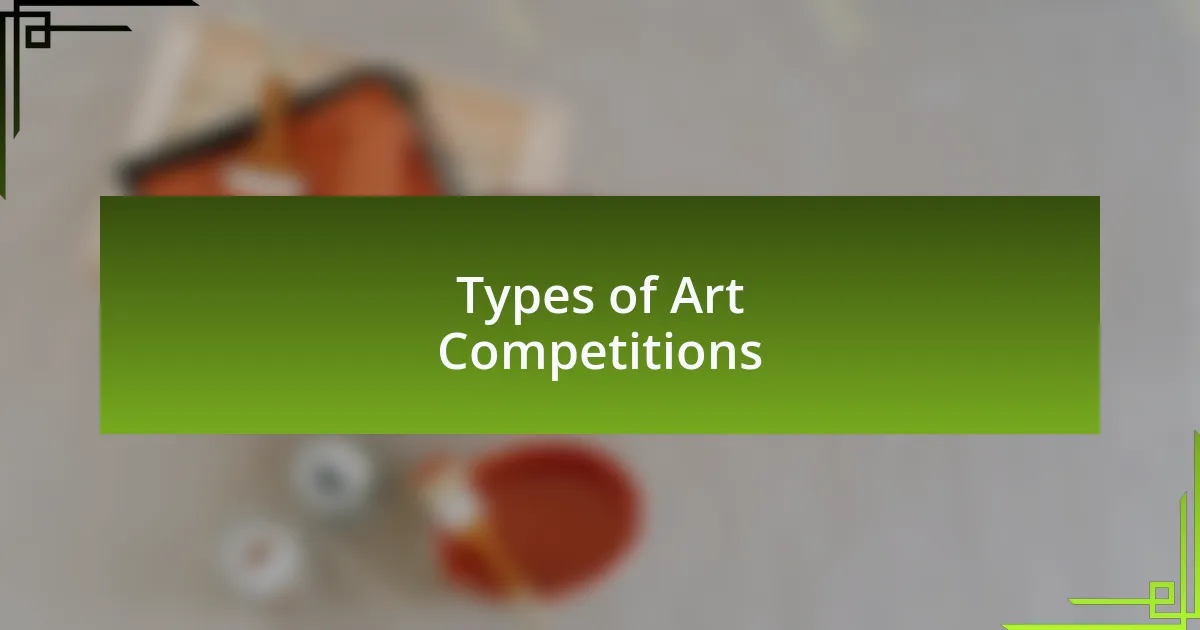
Types of Art Competitions
Art competitions can be categorized into various types, each offering unique opportunities for artists to express themselves. One type is the juried competition, where a panel of judges selects winners based on specific criteria. I remember my first juried event; the anticipation of waiting for the results was nerve-wracking but also exhilarating. It highlighted the competitive nature of artistry while showcasing true talent.
Another fascinating type is the open-call competition. These events often encourage anyone to submit their work, meaning you might find a mix of emerging and established artists all vying for recognition. I once stumbled upon an open-call in my town—what a delight it was to find a space where all sorts of creativity could flourish! It felt like a celebration of diversity and expression.
There are also themed competitions that revolve around a specific subject or medium. For instance, I was particularly drawn to a competition focused solely on environmental art. Seeing how artists creatively addressed such an important topic through varied mediums—from sculpture to painting—was eye-opening. Have you ever thought about how a specific theme can inspire creativity in unexpected ways? It’s incredible to witness the different interpretations that emerge.
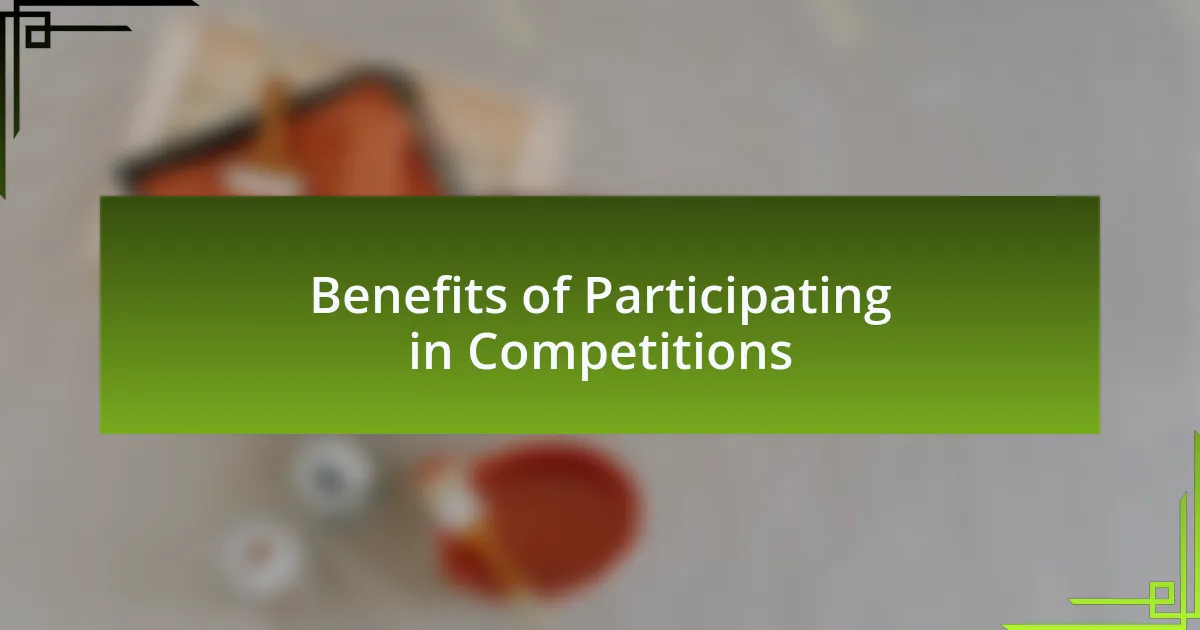
Benefits of Participating in Competitions
Participating in art competitions can significantly boost an artist’s confidence. I remember when I entered my first competition; the mere act of submitting my work made me feel accomplished, regardless of the outcome. That experience taught me how stepping outside my comfort zone can ignite growth and resilience.
Another critical benefit is the exposure that comes with competing. I’ve personally seen how my work gained visibility through competitions, connecting me with fellow artists and art enthusiasts. It’s fascinating how a single submission can lead to new opportunities—like collaborations or even shows. Have you ever thought about how networking can transform your artistic journey?
Moreover, competitions often provide valuable feedback from judges or peers, helping artists refine their skills. I once received constructive criticism that pointed out aspects of my artwork I had overlooked. This feedback became a catalyst for improvement, prompting me to experiment with new techniques. Isn’t it amazing how constructive criticism can elevate our work to the next level?
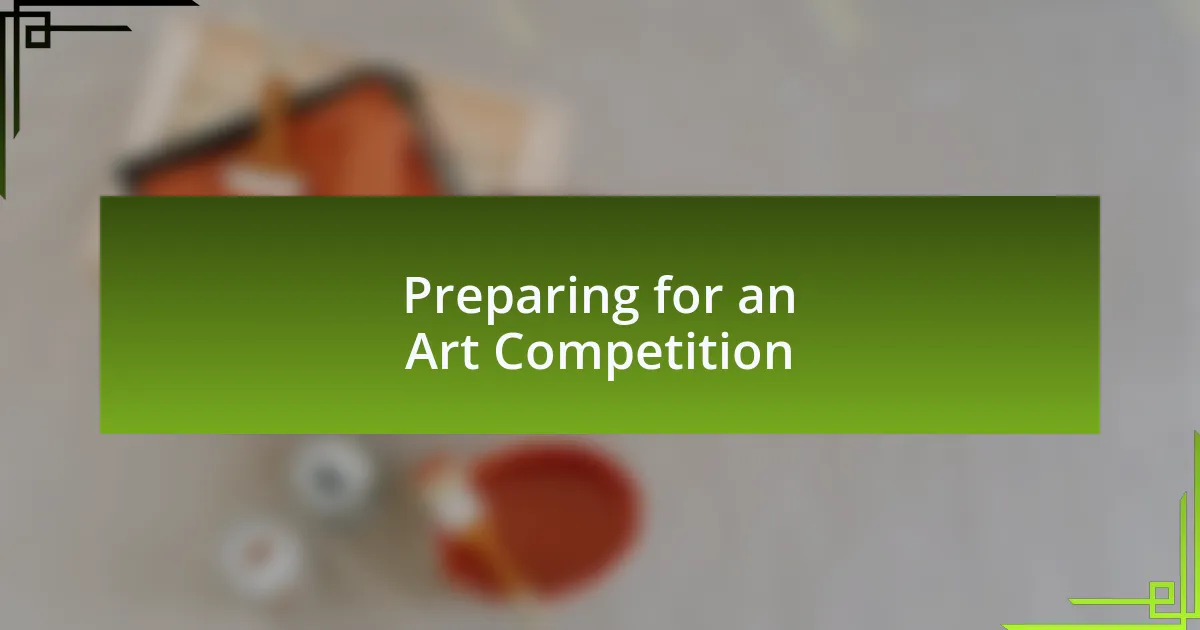
Preparing for an Art Competition
Preparing for an art competition can feel like an adventure, and I always go in with a clear plan. For my last competition, I created a checklist that included everything from gathering my materials to setting up a timeline for my creative process. Have you ever noticed how a structured approach can really alleviate that pre-competition anxiety? It’s amazing how much more focused I felt when I had everything laid out in front of me.
Another crucial aspect of preparation is understanding the competition guidelines. I’ve made the mistake of overlooking details in the past, only to realize too late that my submission didn’t meet the criteria. Reading through the rules with a fine-tooth comb is essential. It can be frustrating, but trust me, avoiding last-minute surprises is well worth the effort. Have you ever found yourself in a similar situation?
Finally, practicing your presentation can make all the difference. I recall a competition where I rehearsed explaining my artwork to friends, which gave me the confidence to articulate my vision clearly. This preparation not only helped me connect better with the judges but also made the experience more enjoyable. Isn’t it rewarding to see your hard work and thought process resonate with others?
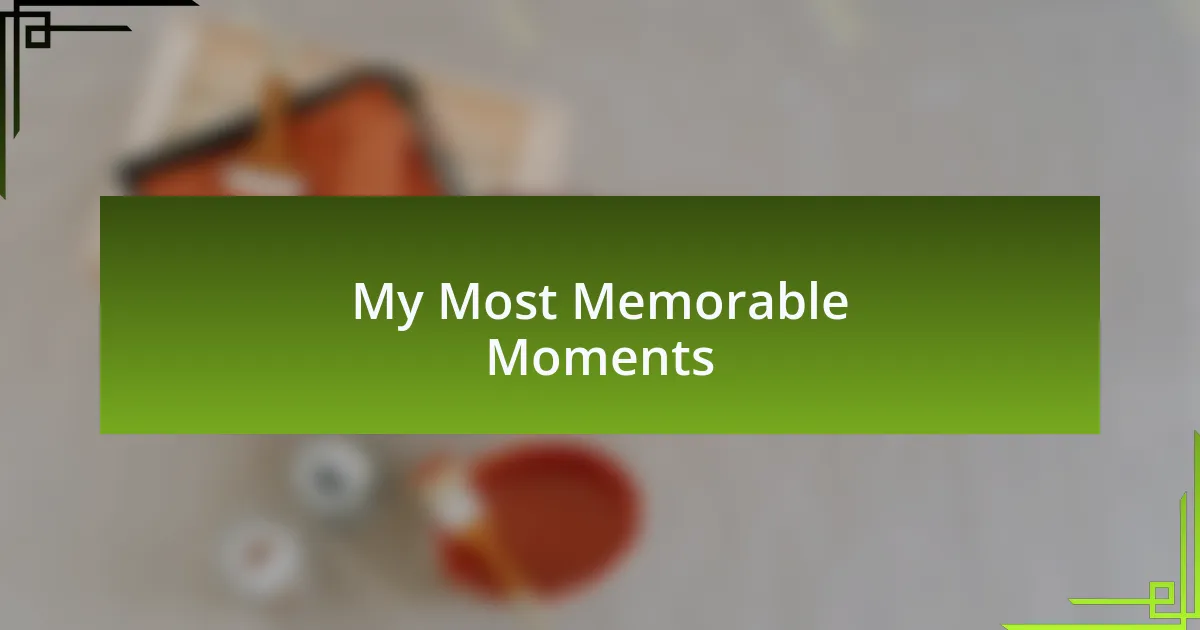
My Most Memorable Moments
Whenever I think back to my most memorable moments at art competitions, one stands out vividly. During my first major competition, I nervously approached the judges, clutching my artwork like a lifeline. To my surprise, they asked me about my inspiration, and as I spoke, I saw their eyes light up—those few moments of connection felt electric. Have you ever shared something so personal that it created an instant bond?
Another unforgettable experience was when I won my first award. The moment they announced my name, I could hardly believe it—my heart raced, and I felt a mix of disbelief and joy wash over me. Standing on that stage, I could see my friends cheering, their support infused me with a sense of gratitude that I still cherish. Do you recall a time when you felt the overwhelming support of those around you?
Perhaps one of the most emotional moments occurred when a fellow competitor approached me after the competition. They shared how my work had inspired them to push their own creative boundaries. I suddenly felt honored, realizing that art not only serves as a personal expression but also as a catalyst for others. Isn’t it incredible how our creations can resonate beyond our own experiences?
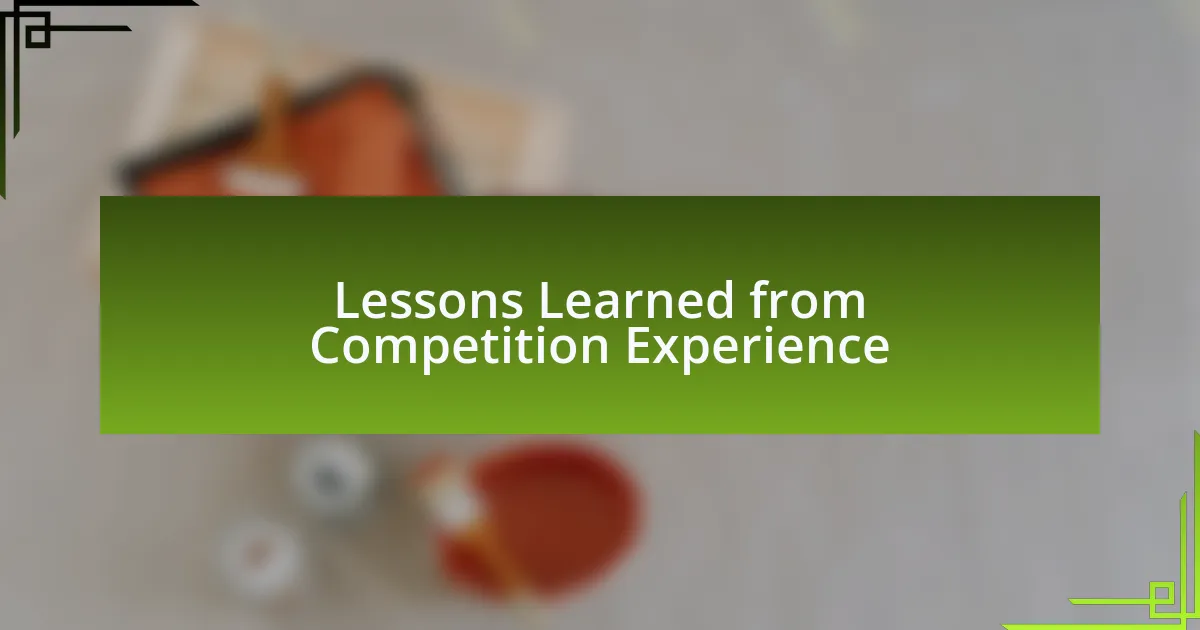
Lessons Learned from Competition Experience
Experiencing the highs and lows of competition profoundly shaped my approach to art. I vividly remember the sting of not placing in one competition yet realizing that the feedback from the judges was invaluable. Have you ever taken a risk and learned something unexpected from the outcome? In my case, that experience pushed me to refine my techniques and explore styles I hadn’t considered before.
One lesson that stands out is the importance of resilience. I faced moments when self-doubt crept in, especially when comparing my work to others. I can recall a time when I sat in a corner, overwhelmed by the skill surrounding me, and almost considered quitting. But instead, I chose to channel that energy into my next piece. Isn’t it amazing how moments of vulnerability can turn into compelling motivation?
Moreover, I learned the significance of community and support. At one competition, a fellow artist shared tips on their technique that they had honed over years. That spirit of collaboration rather than competition struck me deeply. Have you ever found guidance unexpectedly from someone you viewed as a rival? It reminded me that while competition is fierce, the art world thrives on shared knowledge and mutual encouragement.
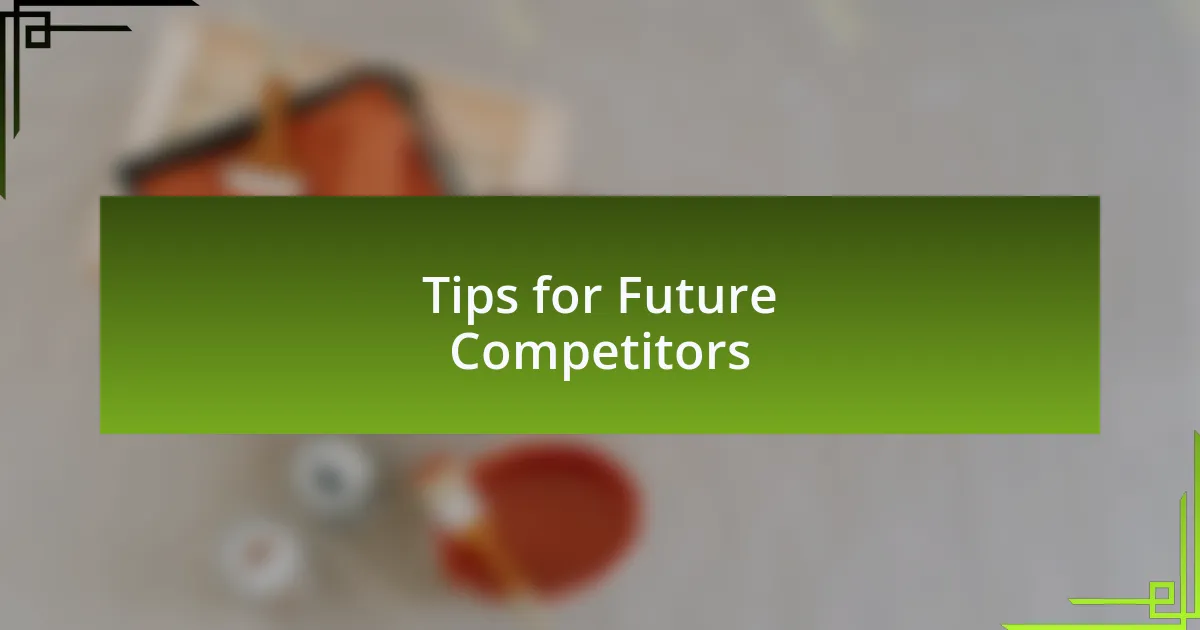
Tips for Future Competitors
When preparing for future competitions, first and foremost, I recommend immersing yourself in the event’s theme and guidelines. I remember one time when I narrowly missed out on the top spot because I had strayed from the competition’s core prompt. It’s crucial to keep that focus clear to ensure your work resonates with the judges’ expectations. Have you ever felt like your artwork was far removed from what the competition was asking for?
Practice makes perfect, but I’ve found that critique can refine your skills even further. Before a major event, I gathered a group of trusted friends who offered brutally honest feedback on my pieces. That honest input was enlightening and pushed my artwork to new heights. Have you sought a fresh perspective on your art? Collaborating with others can ignite ideas you never considered alone.
Lastly, don’t underestimate the power of staying grounded and enjoying the process. I distinctly recall one competition where I was so stressed about the outcome that I forgot to savor the moment. Instead of worrying about the results, focus on what drives your passion for art. How fulfilling is it to create something reflective of your unique voice? Embracing that joy can transform your experience and lead to unexpected triumphs.